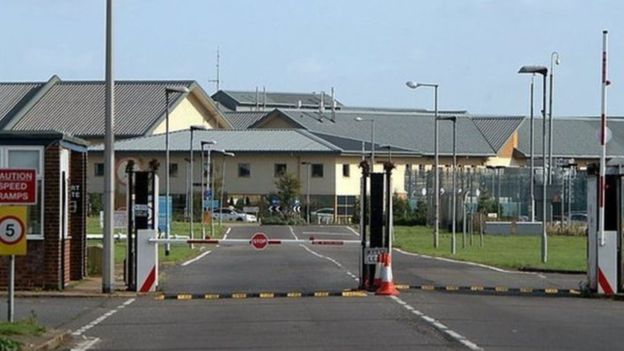The number of people held in UK immigration removal centres has dropped by more than two thirds during the pandemic, figures reveal.
More than 700 detainees were released between 16 March and 21 April as the government responded to concerns about the spread of infection.
Campaigners are calling on authorities “to do the humane, responsible thing, and close centres altogether”.
The Home Office said detainees welfare was taken very seriously.
In March, the High Court rejected calls to free all remaining immigration detainees, after human rights activists claimed there was a real risk of serious harm from an outbreak of Covid-19.
Figures released during the legal challenge show there are now 368 people being held, the charity Detention Action said.
According to detainees, there are only 13 women left at the Yarl’s Wood immigration removal centre in Bedfordshire, after a case of coronavirus sparked panic – and dozens of people were released.
Tinsley House at Gatwick Airport, and Dungavel in South Lanarkshire, are also thought to be nearly empty.
About 50 people are believed to have been deported.

Charities working with recently released detainees say many have UK addresses, while others, including asylum seekers and ex-offenders, have been provided housing and support.
However, there are anecdotal claims some foreign nationals have been allowed to walk out of Immigration Removal Centres (IRCs) without money or accommodation.
One former detainee, using the name Jolene, who was released from Yarl’s Wood last month, described the process as “chaotic”.
“There was a weird atmosphere after an outbreak of Covid-19 in March and some of the staff started whispering to each other and wearing face masks,” she said.
“They told us not to worry; that we would be safer inside the centre, but the residents were terrified and one group threatened to strike.
“A few days later people were being let go without warning – 15 or 16 people a day.”
“I was told that I was about to be deported but then something suddenly changed and I was left at Bedford Station instead,” she added.

Like other recently-released detainees, Jolene is required to check in at a reporting centre on a given date.
Karen Doyle from the charity, Movement for Justice, said: “There are reams of reports exposing the problems of immigration detention; how it worsens people’s mental health, how it is costly and ineffective.
“Now we also know the centres can be easily emptied and people can manage their cases in the community.”
Removal centres are used to detain thousands of foreign nationals every year who face a realistic prospect of being deported.

There are currently nine IRCs in the UK, including two short-term holding facilities in Manchester and Belfast.
Most detainees who pass through them are bailed – or found to have a right to remain in the UK.
Drake – not his real name – was released on bail from Brook House near Gatwick Airport in April.
He said everyone was locked in their cells for 24 hours a day when one of the residents became ill with Covid-19. He says there are only about 40 people left at the centre.
“Around 20% of them have been granted bail, but they haven’t got an address to go to so they’re not able to leave,” he said.
“I’m guessing that as soon as the lockdown is over, they’ll start pulling everyone back.”
‘Losing battle’
Bella Sankey from Detention Action, which brought the legal challenge, said the litigation “forced major, rapid concessions from the government, including the release of 350 detainees in one week and a halt on new detentions of people facing removal to 49 countries.”
She said: “The Home Office is fighting a losing battle by continuing to detain at all in these circumstances.
“And it is shocking but not surprising that the majority of those left in IRCs right now are accepted to be vulnerable adults at risk.”
The Home Office said: “The vast majority of those in detention, at this time, are foreign national offenders. It is only right that we continue to protect the public from dangerous criminals.”
It said the welfare of the detainees in its care was taken very seriously and it was taking the necessary precautions to ensure that any risk of Covid-19 is minimised, including for those who may be particularly vulnerable.
A spokesman said: “Decisions to detain someone are made on a case-by-case basis and as circumstances change and cases are reviewed, release on immigration bail may become the most appropriate option.”


